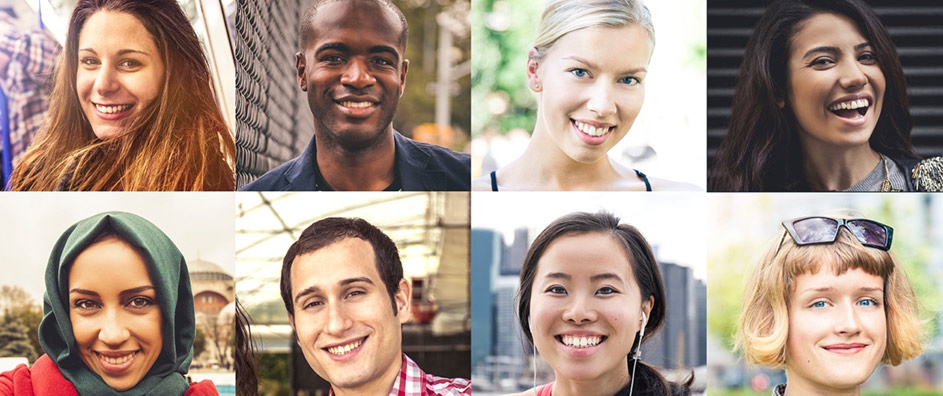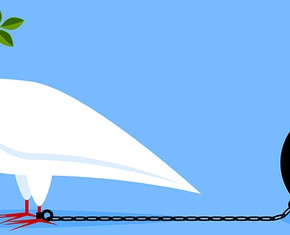The views expressed in our content reflect individual perspectives and do not represent the authoritative views of the Baha'i Faith.
Have you thought about transplanting unworthy assumptions to create more sustainable relationships? Or amending your January resolutions to include remapping your vision of others to weed out negative stereotypes? How about grafting in new impressions that emphasize the best qualities of groups, co-workers, or even family members?
Part I of this two-part series presented a metaphor for the role of spirituality in helping humanity reach beyond stereotypes, given the divisive influences in today’s social milieu. This second article addresses the personal question: How do we resolve to undo the stereotypes that keep us from seeing the best in groups and individuals?
The book cited in the first article, Gleanings from the Writings of Baha’u’llah, offers relevant challenges to the people of our time, including the suggestion:
Do not busy yourself in your own concerns; let your thoughts be fixed upon that which will rehabilitate the fortunes of mankind and sanctify the hearts and souls of men. – Gleanings from the Writings of Baha’u’llah p. 93.
Admittedly, the goal sounds formidable, but the prescription does not necessitate air fare and big bank accounts for “saving the world” as much as it prioritizes triumph over self, as the next sentence reads:
…This can best be achieved through pure and holy deeds, through a virtuous life and a goodly behavior. Valiant acts will ensure the triumph of this Cause, and a saintly character will reinforce its power. – Ibid.
Few of us consider ourselves saints, and yet, apparently, to sanctify the hearts and souls of men, we must explore our own inner thoughts to undo the stereotypes that prevent us from acting to benefit the hearts and souls of all people, rather than benefiting only those who agree with us. These suggestions may help, from sociologist Jack Mezirow’s Transformative Learning:
1. Explicitly write or rewrite your predominant belief about people.
Our underlying beliefs function as the culprits that shape our mental models and sometimes generate stereotypes. When negatively driven, they complicate our relationships, disrupt our goodly deeds and make us obsessed with our own concerns.
To shift our mental model, we may begin by thinking honestly about the patterns that have created unhappy outcomes in our past, and writing down the basic premise that drives most of our interactions. If we often feel misunderstood or if we tend to create misunderstanding in others, our own or others’ combined personality traits and life experiences may have generated fixed expectations, resulting in stereotypes and sometimes in painful outcomes.
To truly see the good in others, we may want to rewrite a personal underlying premise or belief statement that does not “busy ourselves with our own concerns” but, rather, enlarges our belief in the good of humanity.
For example, perhaps your prevailing experiences have created mistrust, so when you meet people in new situations, you recite the mantra: “Others victimize me. I will always watch for signs that you will disappoint me.”
You can now rewrite an underlying belief statement in your journal, such as:
“I believe that most people, at heart, have the same hopes, concerns and potential for good. I will search for the part of you that aspires to help others.”
As you let a conscious underlying premise guide your daily interactions, record any shift in previously unconscious stereotypes, about yourself or others:
2. Check your outerwear at the door.
 We each walk into a room with outer wear. Even when we think we have “no religious or racial biases,” we wear our class, affiliations and philosophical identities as we speak, sometimes without listening. This can create barriers that prevent our focusing on the pure intentions of others.
We each walk into a room with outer wear. Even when we think we have “no religious or racial biases,” we wear our class, affiliations and philosophical identities as we speak, sometimes without listening. This can create barriers that prevent our focusing on the pure intentions of others.
The age-old art of asking tactful questions when you meet someone new in a public setting not only encourages the person to share points of connection with you but also enables you to identify their strengths. Checking your own identity or “outerwear” at the door, you can discover what you value in the new friend before sharing information about yourself that might create dissonance. It will give you a chance to look into their eyes, listen for their best qualities and see the good without the distraction of telling your own affiliations first. Your stories of empathic connection can come afterward.
Most of us have learned this lesson the hard way. After working with someone on a racial unity committee for a couple of months, I made the mistake of telling him about the plight of an education project funded by a welcome tobacco tax. I soon noticed he discreetly excused himself at certain intervals during later meetings. He didn’t want to create disunity by mentioning his smoking habit. I had not taken the time to get to know him well enough to first talk about his strengths and to learn what controversial topics might require some sensitivity on my part.
3. Wear a rant-proof coat when you do wear one.
Most of us have enjoyed working or living alongside people of diverse ethnicities and mindsets. The trouble often begins in group discussions when we give in to the external programming (or internal mindset) that asks us to stereotype groups with whom we disagree, instead of beholding human faces.
As I evaluated my New Year’s resolutions to foster more unity in the world, I thought about the discussions of current events that so often exacerbate philosophical stereotypes. I designed some questions I might use to self-assess each day:
If discussions arose about the challenges of our times, how did I refer to absent groups whose perspectives differ from mine? Did I rant or, rather, seek points of unity?
In conversations about the untenable position of a particular figure or special interest group, did I resist the temptation to condone name-calling with my comments or even with a quiet smile of agreement?
Did I protect the justice or human rights of others in society while honoring the rights of dissenters for a respectful tone that encourages their best efforts?
4. Put a human face on stereotyped groups.
To encourage others to move beyond group stereotyping, I determined that I must set an example that transcends negative expectations by seeing and pointing out the good in people from every walk of life. I made a list of the strengths of each person in the room of a workplace meeting I had recently attended, so I could defend them as individuals or as representatives of their often disenfranchised groups. For example:
A leader in the room recently gave a beautiful expression of hope for humanity.
A grandmother always favors sacrifice over ego in her quiet acts.
A mother gives a monthly philanthropic contribution even when temporarily unemployed.
I resolved, in the coming year, to amend any stereotypes I have inadvertently promulgated through my silence when discussions dehumanize wholesale groups of cherished souls by shunning their ideologies, faiths, ethnicities or cultures.
Seeing the good in others may not mean agreeing on solutions to all the world’s problems, but it includes “sanctifying the hearts and souls” by looking deeply into the eyes and seeing the motivation for good that prompts all people to care for their children, to strive for a purposeful life, to preserve a safe world for all living beings – and then to love each of them as part of the human family.
You May Also Like
Comments

















I sincerely do believe people in general should be more accustomed to pain in all its forms. And I don't mean excruciating pain here. :) Even getting more used to slight discomfort helps. Well, everybody knows what ...they say about expanding your bubble!